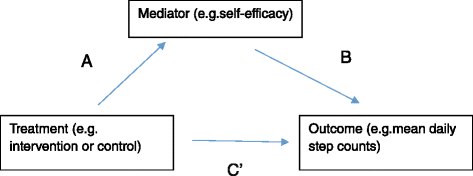Social cognitive theory mediators of physical activity in a lifestyle program for cancer survivors and carers: findings from the ENRICH randomized controlled trial
- PMID: 27075417
- PMCID: PMC4831117
- DOI: 10.1186/s12966-016-0372-z
Social cognitive theory mediators of physical activity in a lifestyle program for cancer survivors and carers: findings from the ENRICH randomized controlled trial
Abstract
Background: Despite increasing numbers of cancer survivors and evidence that diet and physical activity improves the health of cancer survivors, most do not meet guidelines. Some social cognitive theory (SCT)-based interventions have increased physical activity behavior, however few have used objective physical activity measures. The Exercise and Nutrition Routine Improving Cancer Health (ENRICH) randomized controlled trial reported a significant intervention effect for the primary outcome of pedometer-assessed step counts at post-test (8-weeks) and follow-up (20-weeks). The aim of this study was to test whether the SCT constructs operationalized in the ENRICH intervention were mediators of physical activity behavior change.
Methods: Randomized controlled trial with 174 cancer survivors and carers assessed at baseline, post-test (8-weeks), and follow-up (20-weeks). Participants were randomized to the ENRICH six session face-to-face healthy lifestyle program, or to a wait-list control. Hypothesized SCT mediators of physical activity behavior change (self-efficacy, behavioral goal, outcome expectations, impediments, and social expectations) were assessed using valid and reliable scales. Mediation was assessed using the Preacher and Hayes SPSS INDIRECT macro.
Results: At eight weeks, there was a significant intervention effect on behavioral goal (A = 9.12, p = 0.031) and outcome expectations (A = 0.25, p = 0.042). At 20 weeks, the intervention had a significant effect on self-efficacy (A = 0.31, p = 0.049) and behavioral goal (A = 13.15, p = 0.011). Only changes in social support were significantly associated with changes in step counts at eight weeks (B = 633.81, p = 0.023). Behavioral goal was the only SCT construct that had a significant mediating effect on step counts, and explained 22 % of the intervention effect at 20 weeks (AB = 397.9, 95 % CI 81.5-1025.5).
Conclusions: SCT constructs had limited impact on objectively-assessed step counts in a multiple health behavior change intervention for cancer survivors and their carers. Behavioral goal measured post-intervention was a significant mediator of pedometer-assessed step counts at 3-months after intervention completion, and explained 22 % of the intervention effect. Future research should examine the separate impact of goals and planning, as well as examining mediators of behavior maintenance in physical activity interventions targeting cancer survivors.
Trial registration: Australian and New Zealand Clinical Trials registry ANZCTRN1260901086257 .
Keywords: Cancer; Mediators; Physical activity; Social cognitive theory.
Figures
Similar articles
-
Impact of a nutrition and physical activity intervention (ENRICH: Exercise and Nutrition Routine Improving Cancer Health) on health behaviors of cancer survivors and carers: a pragmatic randomized controlled trial.BMC Cancer. 2015 Oct 15;15:710. doi: 10.1186/s12885-015-1775-y. BMC Cancer. 2015. PMID: 26471791 Free PMC article. Clinical Trial.
-
Exercise and nutrition routine improving cancer health (ENRICH): the protocol for a randomized efficacy trial of a nutrition and physical activity program for adult cancer survivors and carers.BMC Public Health. 2011 Apr 15;11:236. doi: 10.1186/1471-2458-11-236. BMC Public Health. 2011. PMID: 21496251 Free PMC article. Clinical Trial.
-
Social cognitive mediators of the effect of the MobileMums intervention on physical activity.Health Psychol. 2013 Jul;32(7):729-38. doi: 10.1037/a0027548. Epub 2012 May 21. Health Psychol. 2013. PMID: 22612557 Clinical Trial.
-
Lifestyle physical activity interventions. History, short- and long-term effects, and recommendations.Am J Prev Med. 1998 Nov;15(4):398-412. doi: 10.1016/s0749-3797(98)00084-1. Am J Prev Med. 1998. PMID: 9838980 Review.
-
Theory-based physical activity and/or nutrition behavior change interventions for cancer survivors: a systematic review.J Cancer Surviv. 2024 Oct;18(5):1464-1480. doi: 10.1007/s11764-023-01390-5. Epub 2023 May 3. J Cancer Surviv. 2024. PMID: 37133640 Free PMC article.
Cited by
-
Effect of a theory-based educational intervention for enhancing nutrition and physical activity among Iranian women: a randomised control trial.Public Health Nutr. 2021 Dec;24(18):6046-6057. doi: 10.1017/S1368980021002664. Epub 2021 Jun 21. Public Health Nutr. 2021. PMID: 34420543 Free PMC article. Clinical Trial.
-
Long-term Effectiveness of mHealth Physical Activity Interventions: Systematic Review and Meta-analysis of Randomized Controlled Trials.J Med Internet Res. 2021 Apr 30;23(4):e26699. doi: 10.2196/26699. J Med Internet Res. 2021. PMID: 33811021 Free PMC article.
-
Longitudinal Associations Between Changes in Cigarette Smoking and Alcohol Use, Eating Behavior, Perceived Stress, and Self-Rated Health in a Cohort of Low-Income Black Adults.Ann Behav Med. 2022 Jan 1;56(1):112-124. doi: 10.1093/abm/kaab029. Ann Behav Med. 2022. PMID: 33970236 Free PMC article.
-
Effects of personalized exercise prescriptions and social media delivered through mobile health on cancer survivors' physical activity and quality of life.J Sport Health Sci. 2023 Nov;12(6):705-714. doi: 10.1016/j.jshs.2023.07.002. Epub 2023 Jul 17. J Sport Health Sci. 2023. PMID: 37467931 Free PMC article.
-
Exploring psychosocial mediators of remote physical activity counselling: a secondary analysis of data from a 1-year randomized control trial (Movingcall).J Behav Med. 2020 Apr;43(2):271-285. doi: 10.1007/s10865-019-00112-6. Epub 2019 Oct 16. J Behav Med. 2020. PMID: 31620974 Clinical Trial.
References
Publication types
MeSH terms
Associated data
LinkOut - more resources
Full Text Sources
Other Literature Sources
Medical


